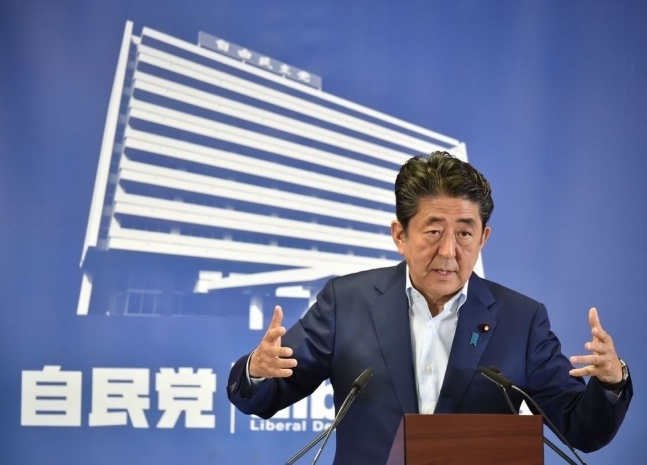 |
|
Japanese Prime Minister Shinzo Abe holds a press conference at the Liberal Democratic Party headquarters in Tokyo a day after the House of Councillors election on July 22. (AFP/Yonhap News)
|
Legal experts say Tokyo has breached international law
Legal experts say that the Japanese Ministry of Foreign Affairs violated the Hague Service Convention when it returned a letter containing a South Korean court order for the seizure of assets in connection with a damages lawsuit filed by Koreans subjected to forced labor during the Japanese colonial occupation. Critics say that the Japanese government has contravened international law in its effort to block the damages litigation. According to legal sources who spoke with the Hankyoreh on Aug. 6, Japan’s Foreign Ministry received a request on Feb. 7 for overseas service of a decision ordering the seizure of assets belonging to Japanese corporation Nippon Steel, the request having been sent by South Korea’s National Court Administration, which reports to the Supreme Court. After failing to take any sort of action for more than five months, however, Japan’s Foreign Ministry returned the documents to the Pohang branch of the Daegu District Court on July 19, without specifying any reason for doing so. This action by Japan’s Foreign Ministry is in violation of the Hague Service Convention, which states that a government must specify the reason why a document has not been served. The Hague Service Convention, a multilateral treaty to which more than 70 states are parties, seeks to facilitate the overseas service of judicial documents in civil and commercial litigation. Though violations of the convention don’t trigger sanctions, it’s typical for states to comply with such multilateral treaties. States are only permitted to refuse a request they have received for service when they deem the request to endanger their national security or sovereignty. Even in such a case, however, they’re obligated to notify the party making the request and the other state of the reason for their refusal. It’s unusual for Japan’s Ministry of Foreign Affairs to refuse to serve a document. Since the damages lawsuit was filed against a Japanese company in the private sector, it would hardly qualify as a threat to national security or sovereignty, the reasons provided by the convention for refusing to serve a legal document. Moreover, service of the documents is part of the process of implementing the South Korean Supreme Court’s decision from October 2018, and the assets have already been seized. “Aside from exceptional cases that could be legally problematic, related documents are served automatically according to the convention. Not specifying the reason [for returning the document] is unusual as well. The basic spirit of the convention is to at least provide a reason,” one judge said. “It’s telling that service was refused not by the Japanese company but by the Japanese Foreign Ministry. In effect, the Japanese government deliberately intercepted a document related to a civil case,” said Lee Sang-hui, an attorney at a legal firm called Jihyang Law. In a statement issued on Tuesday, the legal team for victims of forced labor and their supporters asked the South Korean Ministry of Foreign Affairs to take measures to prevent this from reoccurring. They also asked the Pohang branch court to resend the documents. By Ko Han-sol, staff reporter Please direct comments or questions to [english@hani.co.kr]






